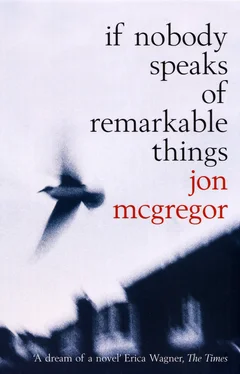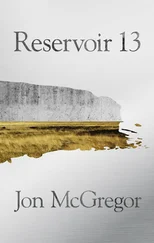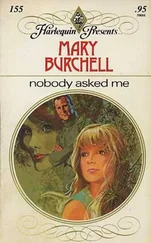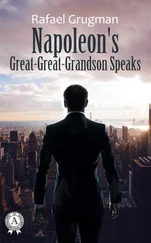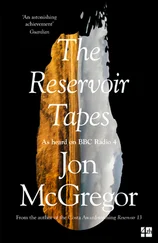We must have been driving somewhere I said, and I tried to remember the journey, where we were going, when it was.
He said what do you want then, and I forgot about it and ordered breakfast.
I said so where’s your brother now then?
He said I don’t know really.
He said he just went travelling and he didn’t really tell us where he was going.
I said oh, but doesn’t he send you postcards, hasn’t he got an email address?
He said erm no not really well sometimes, and he looked out of the window and said he was in Mexico the last time I heard.
He said hey look at that, and I looked and there was a man in a tracksuit using a bin for a toilet.
He was singing, happy birthday, and he was drinking a can of superstrength lager.
I said I recognise him I think.
He sang happy birthday to me happy birthday dear and then he stopped.
And breakfast came and it tasted good, greasy and squeaky and crisp, solid food to last a long day and we didn’t say much while we were eating it.
I tried to remember where I’d been going with my parents when we’d had breakfast at that Little Chef.
I remembered it was a journey started while it was still dark, lying on the back seat under a blanket, watching telegraph wires whipping across a whitening sky.
I remembered my dad rolling his head up and down whenever we stopped the car, squeezing the back of his neck.
My mum saying will you be okay now?
My dad telling me why a haggis has two legs longer on one side and my mum telling him to shush his mouth.
I must have been about seven years old, and I can’t think where we were going because we always seemed to go abroad for our holidays, France, Spain, Portugal, always somewhere south.
I wiped the last bit of egg yolk from my plate with a triangle of bread.
He said what’s happened to your hands?
I said nothing, nothing’s happened to my hands, and I closed my fingers over the cuts and scars on my palms.
He said no let me see, and he reached out to touch my hand and I automatically pulled away.
Oh sorry I’m sorry he said, I didn’t mean, and he didn’t finish his sentence.
I put my hands in my lap, under the table, and I watched his eyes follow them.
I rubbed them, they felt hot, they felt as though I’d grabbed an electric fence.
He said I’m sorry again, and he was blinking a lot and suddenly he looked exactly like his brother.
I thought about him, that afternoon, sitting on his doorstep looking up at me, the way he spoke, the way he moved through that awful moment.
I said what’s his name, your brother?
He looked at me and he looked down and he finished his tea.
He said excuse me, sorry, I need to, and he took a phone out of his pocket and went and stood by the door.
I watched him making a call, I wondered who he was talking to, I wondered why I didn’t think it was none of my business.
A man hurried past the window with a huge bunch of red roses, it was twice the size of his head, he didn’t look as though he could see where he was going, he was smiling massively and I don’t think anyone in the street turned to look.
I thought about his brother, the times I’d said hello, passing him in the street, standing beside him at the shop counter, I wondered why I’d never thought to ask him his name.
I remembered that whenever I saw him somewhere besides our street he’d always wait for me to say hello first, looking at me slightly sideways, as if he didn’t quite recognise me, or as if he wasn’t sure that I’d recognised him.
Michael came and sat down again, he put the phone on the table and said sorry about that, I just needed to.
The woman came and took our empty plates, and as I passed mine over I saw him looking at my hands again.
I said I’m sorry, I just.
He said I know it’s none of my business, but.
I laid them out on the table.
I said oh it’s nothing, it’s just a bit embarrassing.
He looked at them, and he moved his fingers towards them and this time I didn’t flinch or pull away but he didn’t touch them.
He said what’s embarrassing, what happened?
I said I broke some plates.
I said actually I broke all my plates, I threw them into the sink when I should have been washing them up.
I kept picking up the pieces and throwing them back in and it was only afterwards that I realised I’d cut myself I said.
He looked at me and he didn’t ask me why I’d done it.
I said it had been raining a lot that day, I lost my temper.
He looked at me.
He said raining a lot?
I said yes, you know, it just all got a bit, and I couldn’t really explain and I laughed a little. I was embarrassed.
I thought I’d made myself look stupid.
He said and what else, apart from the rain?
I looked at him, I took my hands off the table and closed my fingers over my palms again.
He said I’m sorry, I know, it’s none of my business.
I looked at him, and I looked at his hands spread across the tablecloth, and I told him.
I told him that about four weeks ago I’d discovered I was pregnant.
That I was scared and horrified and numb with shock.
That I hadn’t been able to tell anyone for a long time and I wasn’t sure why it had been so difficult.
And that when I’d told my mum she’d been polite and indifferent and I didn’t know what she really felt.
I told him that I’d thought she’d be shocked or cross or upset, but that when she was none of these things I was actually unsurprised.
I told him I hadn’t even spoken to my dad yet, that I didn’t even know whether he knew.
I said that I wasn’t ready to have a baby.
I said that I didn’t know what to do.
I said all of this very quietly, and I was amazed to hear the words coming out at all, like butterflies wriggling through net curtains.
He asked me questions, tracing his fingers across the tablecloth as if it was a map.
He asked me for the details, he said stop me if I’m going too far and I didn’t stop him.
He asked me the questions my mother didn’t ask, the who is the and the have you thought about?
I told him about the Scottish boy, and I said I couldn’t do that, I’d never thought about it much before but now that I have I couldn’t do it.
And when I started crying a little he unfolded a paper napkin from the rack and passed it to me and looked away.
He said I’m sorry, I said no, it’s okay, I’m okay, and I twisted the napkin around my finger like a bandage.
He said, your parents, maybe they, perhaps you could go and see them, perhaps it’s just a telephone thing he said. I said I don’t know it’s too far, I can’t afford it, and he said I’ll drive you, please, I’d like to drive you there.
I said, oh, you don’t need to do that for me, I couldn’t, I mean, and he said I wouldn’t be doing it for you.
The daughter of the man with the scarred hands sits in the front doorway of their house, she looks across the street and she sees the boy from the house opposite on his tricycle, he is pedalling along the pavement and his father is walking behind him, carrying a tall glass of water. The boy pedals until he gets to number seventeen, then he scuffles his feet on the paving stones to stop and he looks at his father and points.
His father walks up to the front door and knocks, loudly. He is a tall thin man, with bony hands and a beard cut close to his face. He bangs on the door again, and the twins stop their cricket game to watch.
The door handle moves, and the father straightens his stance, clutches the glass a little tighter. A voice says hold on it’s stuck again I’ll go to the window, and the father steps into the overgrown front garden. A face appears at the window, the boy with the white shirt and the tie, his shirt very crumpled now, he looks as if he’s only just woken up and he squints in the light and he says hello?
Читать дальше
Конец ознакомительного отрывка
Купить книгу
